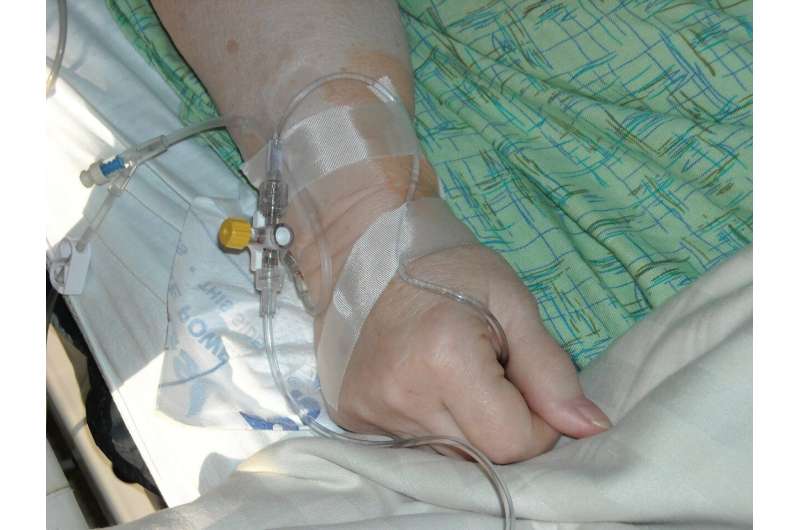We are an affiliate
Newsatw.com is a participant in the Amazon Services LLC Associates Program, an affiliate advertising program designed to provide a means for sites to earn advertising fees by advertising and linking to Amazon.co.uk.“As an Amazon Associate, I earn from qualifying purchases.”


Social isolation is a difficult experience for many people and was particularly distressing during the COVID-19 pandemic. For adolescents who are immunocompromised, physical distancing can be important in managing their risk of serious infection, but it can be an especially negative experience during some of their most formative years.
A recent study by Dr. Lindsay Jibb and Ph.D. student Alicia Kilfoy, both at the Lawrence Bloomberg Faculty of Nursing, and Dr. Chana Korenblum at the Temerty Faculty of Medicine, has found that embedding a psychosocial and peer support program called Teens4Teens into teenage cancer care can help address the isolation that many adolescents face during their treatment, positively impacting their mental well-being.
“One of the biggest takeaways for teens in our study group, was the peer support component,” says Kilfoy. “They wanted a safe space to communicate with other teens with cancer who understood what they were going through.”
One of the unexpected findings from the study, which was published in the journal Supportive Care in Cancer, was that this type of support program also acted as a training ground for skills associated with typical adolescent development, such as peer mentorship, applications to post-secondary education, and future career planning.
“The cancer situation for teens is very unique, in that the disease hits at a time when they are trying to develop their own sense of autonomy,” says Jibb, one of the study’s author’s, Kilfoy’s supervisor, a scientist at The Hospital for Sick Children (SickKids) and an assistant professor at the Lawrence Bloomberg Faculty of Nursing. “Resources in pediatric oncology are often not tailored to this age group, and so this support program, according to our results, appears to be a step in the right direction.”
The Teens4Teens support program was initially designed by Dr. Chana Korenblum, an Adolescent Medicine Specialist in the Division of Adolescent Medicine at SickKids, and implemented by a highly skilled team of Child Life Specialists as a virtual support program for young cancer patients during the COVID-19 pandemic. It provided teens with a sense of a routine and gave them a space to connect through regular virtual sessions with speakers who engaged them on topics related to cancer, but also life as a teen.
“Teens told us they valued having a space where all thoughts and feelings about cancer were welcome, where they could share their stories and swap coping strategies without judgment, and most importantly, where they felt a strong sense of belonging and connectedness,” says Korenblum.
Sessions included moderators who were Child Life Specialists, and guest speakers from various disciplines including nursing and creative art therapy. Each group was involved in addressing coping strategies for grief and navigating difficult feelings using activities such as music and art therapy.
Through qualitative interviews with teen participants, speakers, and moderators, the study identified four broad themes related to the Teens4Teens program, including pathways into the program, implementation capacity, positive impact, and areas for future improvement.
One of the biggest draws for teens to participate in the program according to interviews compiled as part of the study, was a desire for individuals to regain a sense of control. Many who participated in the study reported challenges associated with feeling excluded from decision-making in their own lives, including around medical treatment, and the negative impact of cancer on their sense of self and relationships with others.
“We also saw teens reporting that the program normalized their cancer experience in a developmentally appropriate way, and changed the way health providers were engaging with them as patients,” says Jibb, who also holds the Signy Hildur Eaton Chair in Paediatric Nursing Research at SickKids.
This bidirectional impact of the program, as a result of the interaction between teens and the guest speakers and moderators, was another unexpected finding of the study.
“In addition to the teens reporting positive changes in their well-being, we heard that guest speakers and moderators began to think about treating teens in a more developmentally appropriate way as a result of the program,” says Korenblum.
Although the study revealed that the virtual aspect of the program improved accessibility for some teens who were receiving care on an out-patient basis, a suggestion for improvement was to make the program hybrid with an in-person component to provide more opportunities for meaningful social connection.
According to both Jibb, Kilfoy, and Korenblum, there is currently interest within oncology to enhance teen-centered programming. The Teens4Teens program is a low-cost, feasible intervention that resulted in considerable positive impacts.
Dr. Korenblum would like to see the program more routinely implemented, and the results of the study will help reimagine the program based on direct feedback from the teens, with opportunities to augment it where needed to increase engagement and recruitment.
“Adolescence can be tricky to navigate, and a cancer diagnosis can add many bumps to the road,” says Jibb. “I’m excited to see how this program continues to grow in support of teens with cancer.”
More information:
A. Kilfoy et al, “It just made me feel better”: qualitative examination of the implementation of a novel virtual psychosocial support program for adolescents with cancer, Supportive Care in Cancer (2023). DOI: 10.1007/s00520-023-08054-1
Citation:
Researchers examine implementation of psychosocial support program for adolescents with cancer (2024, May 1)
retrieved 2 May 2024
from https://medicalxpress.com/news/2024-05-psychosocial-adolescents-cancer.html
This document is subject to copyright. Apart from any fair dealing for the purpose of private study or research, no
part may be reproduced without the written permission. The content is provided for information purposes only.
Best Electronic Deals.
Discover the Best Electronic Deals on Amazon Today. Grab Hot Discounts on Top Tech! Don't Miss Out! 🔥 Save Big Now!





















